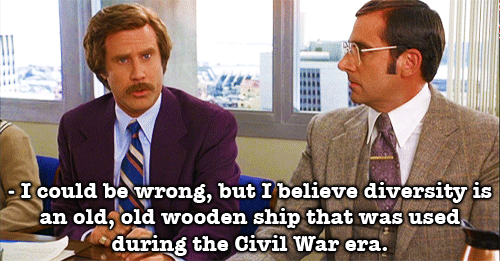Diversity, inclusion, equity and equality; these terms are often used interchangeably, especially in the tech world, but they are not the same.
Contrary to how it's often spoke about:
Diversity does not equate to inclusion
Diversity is not the same as equality
Diversity does not imply equity
Diversity is also not an old wooden ship
Diversity is about representation and the mix of voices and faces that we see
Inclusion is about the behaviors, actions and intent used to embrace these different voices and faces.
Equality aims to promote fairness by making sure everyone in the mix has the same things available to them.
Equity is about giving each individual what they themselves need to be successful. Which may be different for each person depending on their particular circumstance.
You can have a diverse workplace without having an intention of inclusion or equality and without the quality of being fair and impartial. You can be diverse simply by meeting a quota of under represented or minority groups mixed in with the majority, but being inclusive means that you are tolerant and accepting of the other; their beliefs, opinions and values, it means cultivating an environment that not only allows these groups to enter the field by giving them the tools and resources they need to succeed, but also by creating a workplace environment that makes them want to stay and thrive by treating them fairly based on a holistic view of their skills and their merit and what they can contribute.
Creating this culture, toiling this soil, takes a great deal of effort and self reflection. It takes true empathy and compassion and is something; as evidenced by the divisive and divided state of our society and the world, that is extremely difficulty for humans to exercise.
It also means owning up. Taking responsibility for the fact that we all unconsciously or consciously had a hand in creating the systems and state of affairs as they stand now and that an honest look and concerted effort and practice will need to be employed in order to affect real change.
Seth Godin in a recent podcast by Jason Ogle speaks of empathy, saying:
"Empathy is not sympathy, its recognizing that no one believes what you believe, wants what you want and knows what you know and can we be okay with that instead of insisting that we are right and they are wrong. "
This is something that takes practice, not just when we are at work, not just when it is easy, but in our everyday lives in our moment-to-moment thinking and choices. How can we can extend this openness to our children? How can we show this to the waiter that messes up our order, how can we be accepting of ourselves when we are not at our best?
Can we contemplate just how different the lives and experiences of others can be; the 32 year old fashion designer with crippling endometriosis, the 70 year old veteran with PTSD, the colorblind elementary school kid, the 40 year old undereducated immigrant that doesn't have the means of understanding the copy on your website and still develop a feeling of what it might be like to be in their shoes? Can we acknowledge the other and recognize that many of us creating the tech are coming from a certain level of privilege that the ones we design the tech for may not be?
The good thing is, even if we can't imagine it, the only place we can and need to start is where we are right now.
A sense of curiosity
I think it's important to cultivate a sense of curiosity and genuine interest in the experiences of others with non-judgement. Because judgment is really at the core of our diversity and equity problems and in fact at the core of most of our personal problems. Judgment is something that we do automatically.
Non-judgement is central to mindfulness. When you start to pay attention to what's on your mind we realize we have ideas and opinions about everyone and everything. It's a steady stream of labeling things as 'this as good' and 'that is bad'.
It's not about getting rid of judgement; as that's a fundamental part of human nature and the nature of the mind, but it's about acknowledging that we judge, and not condoning or condemning the judgement but rather becoming aware of it so that we can choose to make a different choice.
As Jon-Kabat-Zinn who developed mindfulness based stress reduction explains:
"Because our judgements are often black and white (we like this, we don't like that, this is good, this is bad) we become imprisoned by our point of view. "
Discernment is what we aim for, it is a slight degree different than judging, but it is the practice of seeing what is unfolding as it is and our relationship to it. Cultivating discernment allows us to be more open to the points of views of others and allows real understanding and empathy to seep in.
Cultivating discernment allows us to be more open to the points of views of others and allows real understanding and empathy to seep in.
This is the first step, the internal work that will pave the way for any action of diversifying, inclusion and equality we can hope to take in our workplace and with our products.
The reputation and numbers show that even with well intended actions taken, Silicon Valley and tech at large, has a long way to go where diversity is concerned. While many on all sides cite different reasons for lack of representation of certain populations and demographics, my hunch is that the real problem of judgment and lack of awareness is at the heart of the lack of true change.
“The difference between a weed and a flower is a judgement.”
As educators, mentors and instructors in the field digital product design so much of what we aim to address are the systemic issues that hinder the progress of those who may want to or try to enter into the field of tech and design.
As David Heinemeier Hansson tweeted in regards to the recent Standford student lawsuit:
"Let’s no(t) forget why this college admission scandal is a thing: Because so many American companies use a diploma from a brand-name university as a caste sorting system. This isn’t about “education”, it’s about gate-keeping the aristocrats." Tech companies are notorious for their Ivy preferences. Stanford, MIT, Berkeley. I’m sure you can get a nice education there but gtfo about it being some singular mark of virtue. Evaluate candidates on merits related to the work. Not credentials, not Ivy markers."...this assumption that a quality education must be six figures to be worth it is utterly insane. It’s a debt trap that reinforces the same caste system."
This is why we are working so hard at DesignerUp to make tech education as accessible and affordable as we can and why we are working to change the status quo of an implied caste system based on academic brand rather than skill, mindset and work ethic. Entrepreneurs and creators like DHH continue to prove that nothing more than perception is behind the perpetuation of these misguided judgements and have little if anything to do with any one person's capacity to contribute to innovation and progress in tech.
How can we do better?
First we look inside. Seek to understand ourselves, to sit with ourselves, to befriend ourselves so that we see ourselves clearly. This allows us to bring up from the depths unconscious biases, to see the broader influences in our lives and how they shape our beliefs and world view. To see our natural tendency to judge and to reframe that as discernment.
With this practice we begin to see our true nature and the nature of others. That while there is a tree with huge branches that we can see above the surface there is an equally huge branch of roots that we cannot see that exists below the surface. We start to see the archetype, that we are all the same with the same struggles, obstacles, hopes and dreams. When we come to this realization we start to feel empathy, if we stay with the practice we begin to see the point of view of the other and start relating to them on a different level, with an open mind and heart until they are no longer other, but the same.
We are no longer able to see a person from a non-holistic point of view. We are no longer able to judge a person by the seal on their diploma, the color of their skin, their race, religion or popularity. We see a whole human, with all of their suffering and beauty and we see an opportunity to practice inclusion and compassion.
So we build and we create, we fail and we forgive and keep trying to see better, to do better. We take responsibility and develop our capacity to hold our own suffering and the suffering of others with dignity and respect and feel the calling to contribute to the betterment of all beings.
Diversity is not a buzz-word, it's not a program you start at your workplace, it's not the number of 'other' hires you achieve this quarter. The focus should not be merely on diversity at all but equity, inclusion, compassion and love. When you foster these things within yourself they reflect in your actions, choices and speech; they become your path and shape our systems and in this way we find ourselves creating real change within the workplace, within ourselves and the world around us.
Learn mindful product design and UI/UX with us.


